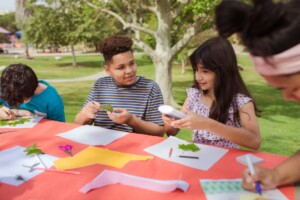 School’s out for summer! It’s the time of year when many Georgia children will attend summer camps, experience the outdoors, or take a dip in the nearest pool. But some students also experience what is known as the “summer slide,” or the loss of educational knowledge due to lack of immersion in an educational environment. With the interruption of COVID-19, this phenomenon has only been exacerbated, and try as they might, education officials can only do so much. As a parent, you can bridge the gap to ensure students have fun but also don’t lose the knowledge they’ve gained during the school year.
School’s out for summer! It’s the time of year when many Georgia children will attend summer camps, experience the outdoors, or take a dip in the nearest pool. But some students also experience what is known as the “summer slide,” or the loss of educational knowledge due to lack of immersion in an educational environment. With the interruption of COVID-19, this phenomenon has only been exacerbated, and try as they might, education officials can only do so much. As a parent, you can bridge the gap to ensure students have fun but also don’t lose the knowledge they’ve gained during the school year.
The Impact of the Pandemic on Learning
The pandemic significantly disrupted education and affected students nationally and here in Georgia. School closures and the shift to remote learning presented hurdles to academic progress. On average, Georgia students lost more than four months of learning in math — almost half of a grade level. In reading, Georgia children lost nearly two months of learning (more than a fifth of a grade level). That’s according to the Education Recovery Scorecard. The scorecard uses test scores from the National Assessment of Educational Progress (NAEP) from 2019 to 2022.
Across the country, students fared even worse. The average public school student in grades 3-8 lost a half year of learning in math and a quarter of a year in reading.
The Importance of Summer School Programs
 Summer school programs play a vital role in counteracting Summer Learning Loss. These programs offer students the chance to catch up on missed content, reinforce key concepts, and prepare for the upcoming academic year. In Georgia, educators are leveraging federal stimulus funds to enhance summer school programs, providing rigorous academic support. Having received nearly $6 billion dollars in federal support since 2020, most allocated funds to boosting academic performance.
Summer school programs play a vital role in counteracting Summer Learning Loss. These programs offer students the chance to catch up on missed content, reinforce key concepts, and prepare for the upcoming academic year. In Georgia, educators are leveraging federal stimulus funds to enhance summer school programs, providing rigorous academic support. Having received nearly $6 billion dollars in federal support since 2020, most allocated funds to boosting academic performance.
“Around 87% of districts have used the funds to hire additional staff to help address student learning loss via one-on-one or small group tutoring. Many districts also used the money to boost summer learning programs,” reports Rebecca Grapevine for Georgia Public Broadcasting (GPB). As parents, your encouragement and support for your child’s participation in these programs can emphasize the importance of continued learning during the summer break.
The Disproportionate Impact on Students of Color
Students of color have faced a disproportionate impact from the pandemic. This disparity underscores the importance of parental involvement in advocating for your child’s educational needs, seeking resources and support, and ensuring equitable opportunities for learning. Your voice and advocacy can contribute to closing educational disparities.
The Role of Parents in Creating a Conducive Learning Environment
Creating a nurturing and supportive learning environment at home is essential in making sure Summer Learning Loss doesn’t continue. You can establish a structured routine that includes dedicated study time, designate a quiet study area, and provide access to educational resources such as books and online learning platforms. Managing distractions during online learning is also key. By setting clear boundaries for screen time and creating technology-free zones, you can minimize distractions and foster a conducive learning environment.
Practical Tips for Parents
Here are some practical tips to support your child’s learning during the summer months:
- Encourage Reading: Provide age-appropriate books and set aside dedicated reading time. Local libraries or charter school resources can offer additional reading materials.
- Engage in Enrichment Activities: Seek out educational activities, field trips, and programs offered by your charter school or local community organizations. These can provide hands-on learning and exploration. For more ideas on engaging activities, explore this list of fun things to do over the summer for students and their families.
- Utilize Online Resources: Supplement formal education by exploring educational websites, virtual learning platforms, and online tutorials. Your charter school may offer online resources tailored to your child’s academic needs.
- Foster Peer Interaction: Encourage social interactions and collaborative learning opportunities. Arrange virtual study sessions or organize small study groups with other charter school students.
- Maintain Open Communication: Stay in touch with your child’s teachers and charter school administrators. Seek their guidance and support in addressing any specific challenges your child may face.
 As parents of charter school students in Georgia, your involvement is key to staving off Summer Learning Loss and supporting your child’s educational journey. The pandemic has underscored the crucial role parents play in education, and your dedication is invaluable. By understanding the impact of the pandemic, advocating for summer school programs, creating a conducive learning environment, and implementing practical tips, you can empower your child to succeed academically during the summer break and beyond.
As parents of charter school students in Georgia, your involvement is key to staving off Summer Learning Loss and supporting your child’s educational journey. The pandemic has underscored the crucial role parents play in education, and your dedication is invaluable. By understanding the impact of the pandemic, advocating for summer school programs, creating a conducive learning environment, and implementing practical tips, you can empower your child to succeed academically during the summer break and beyond.
Your support and engagement are vital to your child’s educational success in the charter school setting. For further inspiration, check out these profiles of graduating high school seniors from Georgia charter schools, showcasing their journeys and post-graduation plans.